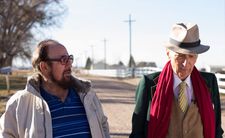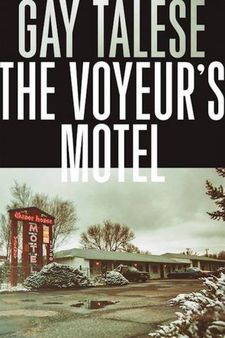On the afternoon of the first day of New York Film Festival press screenings at the Film Society of Lincoln Center, Gay Talese welcomed me into his home to discuss the evolution of Josh Koury and Myles Kane's highly anticipated Voyeur, which will have its world premiere next month in the Spotlight on Documentary programme.
In the first installment of my conversation with Gay, he explained the roles played by Susan Morrison and David Remnick of The New Yorker and the reaction when Gay's literary agent Lynn Nesbit showed his unpublished work The Voyeur's Motel to Grove/Atlantic president and publisher Morgan Entrekin. We spoke about Gerald Foos, the subject of his book, the timeline of the movie deal gone wrong with Steven Spielberg and Sam Mendes, and how an article on New York Yankees manager Joe Girardi from 2012 eventually led to the film Voyeur.
 |
| Gay Talese with The Voyeur's Motel subject Gerald Foos: "I met this guy in 1980. I saw him for three or four days." |
Gay Talese: When are you going to see this Voyeur documentary?
Anne-Katrin Titze: I was going to see it this afternoon. Now they switched it with the Joan Didion documentary [Griffin Dunne's Joan Didion: The Center Will Not Hold], which is also Netflix. And the Voyeur will now be next week. I don't talk to directors before seeing a film. But you are the subject. So tell me ...
GT: But you know, I had nothing to do with this. I had no control. I saw it when it was finished. It's not like I had right of approval.
AKT: Were you a bit nervous before seeing it?
GT: No, no. Nervous at 85? I'm not nervous about much because there isn't much that's going to happen to me now that hasn't happened in one way or another 20 times in the last 50 years. Curious, though. As a voyeur, you should be curious. And both of us are, the voyeur I dealt with in the book, [The Voyeur's Motel] and me, the narrator of the story.
AKT: So you saw the documentary a few weeks ago?
GT: I saw it once. The director, Myles Kane, as you know, I knew him at The New Yorker. He worked there. And one time, five years ago, I did a New Yorker profile [The Crisis Manager] on a baseball manager for the Yankees, named Joe Girardi. And after that was over, The New Yorker had a little video of me. And this guy Myles Kane did it and he said "I'd like to do more of you."
 |
| New Yorker Editor-in-chief David Remnick Photo: Anne-Katrin Titze |
So, alright, I thought it was something for students of journalism. I thought it would be for a documentary that you would show in classrooms. Something that would interest students of nonfiction writing. At that time I had the New Yorker assignment to do the Voyeur.
AKT: I remember. You told me about it then.
GT: Now, the assignment to do the Voyeur was agreed upon by my editor Susan Morrison. She cleared it with David Remnick [Editor-in-chief of The New Yorker], of course. But that subject had been on my mind for thirty some years. I met this guy in1980. I saw him for three or four days. The last time I saw him was about 2014. Because I don't do off the record.
I told you this many times. I hate unsourced material. My readers have to know where I get my information. So this guy wouldn't talk to me on the record. Why would he? He'd be going to jail, the voyeur, I mean, this guy Gerald Foos. So I didn't think I'd ever do this. So in 2014, I went to see the voyeur and his wife in Colorado.
AKT: In 2014?
GT: 2014, 2013, whatever it was. I went there several times. Maybe after my third trip to Colorado, the voyeur himself said "You know, I have this great collection in the basement of my house of sports memorabilia." He says it's worth millions. Baseballs and all kinds of stuff. His whole basement is like a store, like a museum, really.
 |
| Gay Talese: "I went there several times. Maybe after my third trip to Colorado, the voyeur himself said 'You know, I have this great collection in the basement of my house of sports memorabilia.'" |
He asked if I thought he could get some advertising on this stuff. I said, "I don't know, but these guys are doing films of me, on my reporting. And you could promote this maybe on the internet and you'd find somebody who'll buy this stuff." He had said it's worth 15 million dollars. I don't know what a signed baseball by Babe Ruth is worth.
That's how these guys, Myles Kane and three other people, saw him getting into the picture. My picture, because it's my story - Gay Talese, reporter on the road. How does he do it? How does he research? That's what I thought this was.
AKT: There is a sports connection also, interestingly.
GT: There's a sports connection. That was how Myles Kane's four-man crew got in the house of the voyeur. Little by little, the voyeur felt more comfortable with the camera around. So then they started to go other times with me. Meaning from New York they would go meet me in California or Colorado and film me traveling around. And that's how it started. Then I finally finished the piece in 2014. The New Yorker holds it for two years! I'm going nuts. Because the voyeur is going to die.
They say, "Yeah we're going to use it, we're going to use it." But I'm not new to that because that happened to me with other pieces. They hold stuff a long time. The baseball manager was held for a whole season. So finally I talked to my agent, Lynn Nesbit. She said "Let me show it to some publishers." She shows it to a man named Morgan Entrekin [president and publisher of] Grove/Atlantic. He loved it.
So I go to the New Yorker and say "Listen, these people at Grove/Atlantic want to do a book. So if we can hold this off for six months or a year." So they finally published this thing, the excerpt, The New Yorker did. I think it was in April of 2016. July of 2016, the book was published. These guys, Myles Kane, I still thought they were doing me as a reporter - Gay Talese working now.
 |
| Gay Talese on The Voyeur's Motel: "I hate unsourced material. My readers have to know where I get my information." |
AKT: That's how you explained it to me then, yes.
GT: When the New Yorker [article] and the book was published - Spielberg! You know the story.
AKT: … showed interest, I know, yeah.
GT: I had a million-dollar deal. But I didn't get the money because the agents didn't go after the money, as they should have. And then the Myles Kane people finished their documentary. And they put a little blurb in some Hollywood newspaper. It's all over the internet. And Steven Spielberg's guy, named Sam Mendes, happened to read it.
Coming up - Gay Talese on Steven Spielberg and Sam Mendes, The Washington Post story, being watched by the voyeur while Gay was on Late Night with Seth Meyers, Joan Didion as a "beloved angel", on not being Faulkner or Proust, the characters of The Voyeur's Motel, the thought of Anthony Hopkins as a voyeur, and "the genre of the Gay Talese storytelling."
New York Film Festival Voyeur public screenings: Wednesday, October 4 at 9:30pm - Walter Reade Theater; Thursday, October 5 at 6:00pm - Howard Gilman Theater - Expected to attend: Gay Talese, Myles Kane and Josh Koury
The New York Film Festival runs from September 28 through October 15.








_600.jpg)













